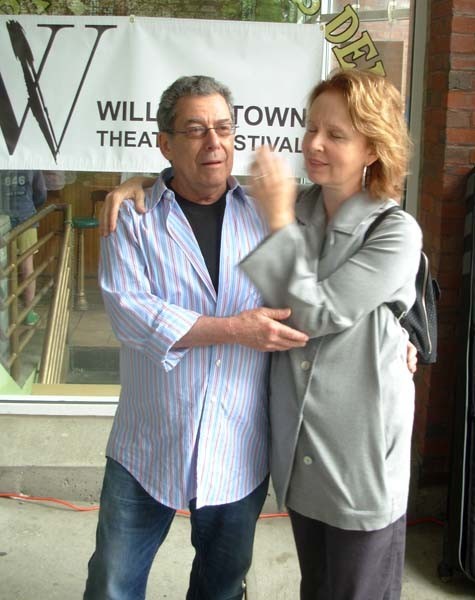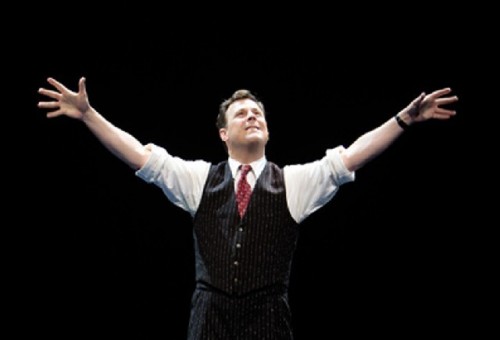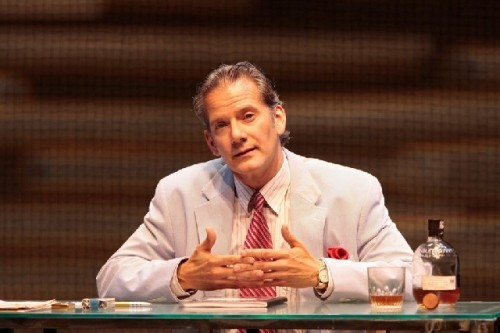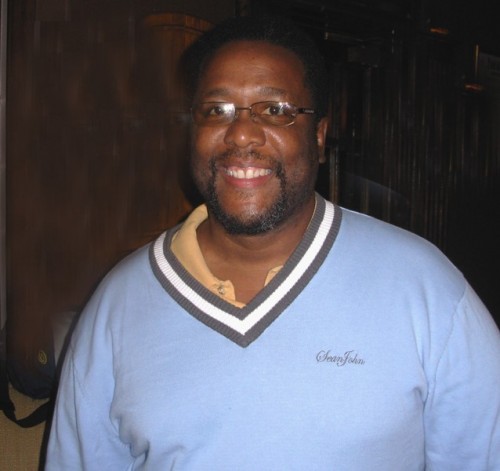Nicholas Martin Returns to Williamstown Theatre Festival
Part One With the Former Artistic Director
By: Charles Giuliano - Jul 20, 2011
Nicholas Martin, now 71, was in his fifties when he started to direct. So far, he has brought seven productions to Broadway. After eight years as artistic director of The Huntington Theatre in Boston he assumed that position at the Williamstown Theatre Festival from 2008 to 2010. During the fall of 2008 he suffered a stroke but, with the support of a capable staff and a Rolodex of friends, as he likes to put it, he filled the next two years of a contract.
When Martin took over WTF was widely viewed as having slipped from its perch on the top tier of regional theatre in America. Under Martin, and Roger Rees for the three years prior, WTF was run by producers who also had their hands in as directors.
There is a change with the appointment of Jenny Gersten, now reaching the mid point of her first season. She is entirely focused on producing and administration of the multi faceted WTF which has a renowned educational program. The festival, an independently endowed entity, rents space from Williams College from mid June through the end of August.
The job of artistic director, under normal circumstances, is prestigious and demanding. That Martin accomplished this while recovering from a stroke is truly remarkable. It is a signifier of his endurance, resilience, and dedication to theatre.
He has returned this summer to direct the comedy She Stoops to Conquer (Oliver Goldsmith, 1773) on the Main Stage from July 27 through August 7.
I first started talking with Nicky, as he is known to friends, when we collided coming out of the men’s room during a party following an opening. It was the first of a number of hilarious exchanges. On a Monday and a break from an intensive, three weeks of rehearsal, we met for a wide ranging discussion. It touched on his time at WTF, a life in theatre, and the current state of criticism. As in the past, there were moments of warmth, humor, sharp insight, and contagious, indeed viral, humanity.
Charles Giuliano So this year you’re just having fun.
Nicholas Martin. Yes. We’re working but I have none of the administrative responsibilities. Jenny (Gersten) is doing a great job.
CG What is the function of an educated media? What is the difference between a review and a critical dialogue? How important is that difference? Here in the Berkshire we have four major theatre companies doing world class work. Do we have a media on the level with the kind of substantial work that is being done? How important is it to have a critical dialogue? What we see too much of is thumbs up, thumbs down reviewing and now on to the next show.
NM I agree.
CG The first production here of Streetcar Named Desire, for example, was problematic. Do you agree?
NM Yes.
CG I got to talk with Jessica Hecht (Blanche in Streetcar).
NM That’s a treat.
CG The artist is the primary source and it makes such a difference to talk with an actor or director about what is intended in the production. I came away from talking with her with valuable insights.
NM She’s a genius.
CG It helps to understand that there are things I should have seen in the production.
NM A reviewer in the old days. I don’t want to be one of those old guys who are always reminiscing and nostalgic. One does have to depend on that now and then when you are my age. But I do think that in the age of serious criticism. I am speaking of course of the New York papers and the English tradition, people had a historic sense. They had a history of the theatre in general. And specifically in their areas. In their geographical areas and they were more informed. There was more of a mutual respect between the creative community of the actors and the critics. I think they helped one another. But I have watched the erosion of that over the years. I have watched the erosion of journalism in general and that includes the New York Times. This is the old argument of whether you base criticism on biographical information, include that, or just consider the work itself.
CG Are we discussing Ludwig Wittgenstein and formalism?
NM If you wish. I’m not going to discuss that on a rainy day in the Berkshires. But in a way you are talking about that regarding being informed. In the age of critics like Walter Kerr (1913-1996) and Brooks Atkinson (1894-1984) of the Times, the major difference I think between them and the current critics, I don’t want to dish the Times at all, is that they truly loved the theatre. Like you do Charles. They also had considerable credentials which were worth while. They had seen millions of plays. They were able to compare productions and I don’t see much of that anymore. Maybe after they have been reviewing significant work for ten years, fifteen years. Then I see some kind of growth in their evaluations.
But, generally speaking, I think you guys should review what’s up there. It think it’s great that Jess (Hecht) talked with you about what they were striving to do.
CG It’s tough and takes time to create a dialogue and build trust. We seemed to hit it off right away three years ago during your first season.
NM I shoot my mouth off. I’m an interviewer’s dream.
CG Aren’t you though.
NM In Boston I had to cool it. I was saying anything.
CG Let’s go back a step. Is theatre being dumbed down? Is it the same as during “The Golden Age?”
NM No.
CG We’re seeing Hollywood on Broadway. It takes a movie star on the marquee to get a show on Broadway. You’re a theatre person. Theatrical people don’t make much money. So actors have to hope for that occasional TV role or movie.
NM Or in my case direct a Broadway show.
CG Isn’t there a dividing line between theatre and film and television. For most people it’s a blur. So a Scarlett Johansson gets a Tony while a Jessica Hecht does not. But when Hollywood stars come to Broadway, with limited stagecraft, how much of the production focuses on making that actor look good. So is theatre today on the same standard as it was in the past?
NM When you see something beautifully done, staged and acted and designed, yes, it is. But there were more plays. There were bigger audiences and one was not so dependent on movie stars and television stars. Sometimes that works and sometimes that doesn’t.
CG How much do you see?
NM I see a lot because I have a lot of friends I feel I should see. And their work. But I’ve stopped seeing things I know I’m going to hate.
CG So you haven’t been to Spider Man yet.
NM I’m going to give that a pass.
CG How about The Book of Mormon?
NM I love The Book of Mormon. I just said this morning “Thank God for The Book of Mormon.” I was reading in the Times a review of King Lear that the English had brought over. Like all of their productions it’s cool and nobody wants to move anybody. It is all well spoken. There is so much of that going on. It’s why The Normal Heart was so refreshing. The Normal Heart on Broadway is a play which I don’t particularly like. It’s a lot of polemic.
CG Did you see Al Pacino this year?
NM Oh the Shylock. I loved that production. It was beautifully done, by everybody.
CG He’s a true actor.
NM Oh my God yes. He began on the stage. Even in film you can see that he would be just fine on stage.
CG What was that movie he did about Richard III?
NM Oh yeah, Looking for Richard. It was delightful.
CG I don’t know I struggled with that. It raises the issue of film vs. theatre. My actor friends prevail on me about the differences. How do you see Streetcar Named Desire, as we did at WTF this summer, and not come to the theatre with memories of Brando and Vivian Leigh from the film?
NM That’s right. But when a play is really true to the author, a great play like Streetcar, it will seem new and you will forget Brando. But it’s got to be scrupulously true to the play. And not decorated with things like naked ghosts. First of all there’s nothing new about it. It’s been done a million times. Do you know the expression? Have I ever told you this? Everything changes except the avant-garde. That I would like to put on T-shirts and send it around.
CG Are you a square?
NM Oh no. On the contrary.
CG You seem to have a fixed notion of what theatre is and what it should be. That applies to your own work and plays that you choose for others to work with.
NM But I also love when somebody breaks the mold. That’s what I mean about Normal Heart. It was so gorgeously acted that you almost forgot that it wasn’t a very good play. The Book of Mormon is all new. Yet it’s based on a very tried and true formula. It has great songs, interesting characters, and great dancing. Which is what a musical is to me. Wheras Anything Goes is a revival that is a terrific disappointment. Because it is neither accurately recreated or reinvented.
CG What about the Jukebox shows?
NM They’re not for me.
CG There’s going to be one here Ten Cents a Dance.
NM That has particularly good songs.
CG That’s a genre which seems to play well with audiences.
NM Oh it does. Yes, there’s a large audience for it and I’m not among them.
CG We just saw a wonderful production of Tommy at the Colonial. That’s a musical without much text. It’s all music.
NM I like that. That’s not one of these fabricated musicals where they get ten good songs and create a book from them. They don’t work. I produced one last summer.
CG As artistic director for Williamstown Theatre Festival you had a tough three years.
NM Yes.
CG You came in with a mandate to put the festival back on track. The wheels had fallen off and it was your job to get it going again. Clearly you succeeded. The momentum and success that Jenny is enjoying this season you laid down.
NM I would like to think so.
CG In terms of ticket sales and critical reception she has done well.
NM She’s doing a great job.
CG You came in and it was tough.
NM Yes. It was also challenging in a way that I liked. It was true in Boston as well.
CG The Huntington.
NM Yes. That theatre was in disarray. You could do worse than taking over a theatre which is kind of flailing around. If you have the right attitude, and relaxation, and friends. And a rolodex as we like to say. Jenny and I have the same rolodex. But I would like to think that I didn’t do to Jenny what the federal government is experiencing now with the fallout from George W. Bush. Affecting poor Barack in this mammoth way. If I had caused problems here that caused repercussions I would feel awful about it. I would like to think I helped make the festival what Michael Ritchie and Nikos had in the past.
CG You kind of had a mixed record.
NM Everyone does.
CG Your first year was a slam dunk. You came in with the musical She Loves Me. You brought that from the Huntington. It was a big production. That first season several Nikos shows went to Off Broadway. The Atheist, The Understudy, and Broke-ology.
NM We send shows to Off Broadway every season.
CG Not in the second season. You didn’t send any.
NM Are you sure of that?
CG Pretty much so because there was critical discussion about the mix of Nikos plays.
NM I can’t remember.
CG How important is it to send shows on to Broadway and Off Broadway? Is that a measure of success for WTF programming?
NM It’s not that important for a theatre like the Nikos. You’re trying to give young writers a break and a chance to work on their material. It’s nice if it goes but you cannot have that as a goal. Or you’re just going to screw your festival to the wall. You can’t have a successful festival if you’re going to think of nothing but the commercial value of the plays. That’s not what this festival is about. It never has been. It’s about getting artists to have a comfortable place to work. And by artists I mean all of them: The playwrights, the actors, the directors, everybody.
CG How significant is it that a Broke-ology goes on to New York?
NM Significant to whom?
CG Broke-ology premiered here and went on to enjoy a successful run at Lincoln Center. This past year Lyric Stage in Boston produced it. The Understudy started at WTF, had a great run in New York, and also got picked up by Lyric Stage. Although Theresa Rebeck was hardly an unknown commodity.
NM But plenty of the others were. And you will find this is true of good producers in New York like Andre Bishop (artistic director of Lincoln Center Theatre) who is faithful to his writers even when their plays were not as well received. Their initial plays. He was faithful to Pete Gurney. (Gurney’s Sylvia is now on stage at Berkshire Theatre Festival.) Wendy Wasserstein (1950-2006, The Heidi Chronicles) and many, many others. Noah Haidle is a playwright that I have a history with. I would have done pretty much anything Noah sent me (What is the Cause of Thunder, WTF 2009). To use the time to work on the play here.
CG How about The Last Goodbye (2010)?
NM No comment.
CG I loved it.
NM Oh I know all you guys did. Frank Rizzo came and said pretty much what I felt.
CG There were mixed responses but that was an example of giving an opportunity.
NM That motive was correct. But there were problems from the beginning and I spotted them. The text was very messy and it had fabulous musical numbers.
CG Jeff Buckley.
NM And great singers. If you are going to do Romeo and Juliet and make it into a rock musical, a familiar formula by the way, particularly that play, then you can’t just cast singers and you can’t just cast actors. You have to cast people who can do both. Then they will give you a great evening and that was not the case.
CG Why did you do it?
NM Because of what you said. A chance to let some new air breathe.
CG This year in the Nikos we seem to see a different formula.
NM Jenny wants to make the Nikos as important as the Main Stage. And do classical plays as well as new plays.








